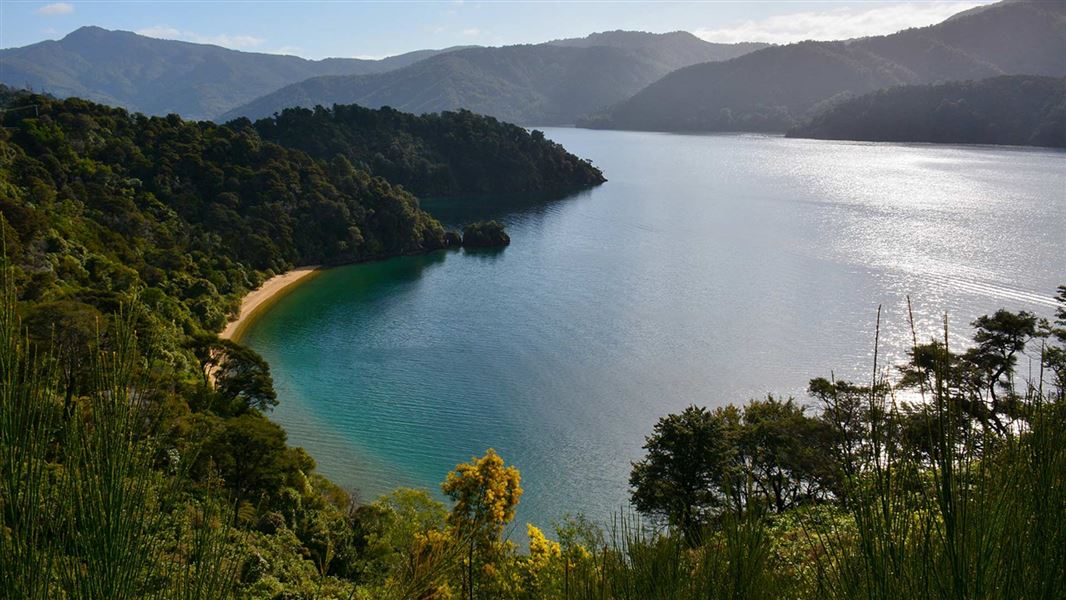
Located in the Marlborough region
Introduction
Camp at one of the many coastal campsites, or take in spectacular bays from the numerous tracks. Visit Captain Cook's favourite New Zealand base.Find things to do and places to stay
Queen Charlotte Sound/Tōtaranui area
Walking and tramping
- No elements found. Consider changing the search query.
- List is empty.
- No elements found. Consider changing the search query.
- List is empty.
Camping
- No elements found. Consider changing the search query.
- List is empty.
- No elements found. Consider changing the search query.
- List is empty.
- No elements found. Consider changing the search query.
- List is empty.

Aussie Bay Campsite
Bay of Many Coves Campsite
Black Rock Campsite
Hunting
- No elements found. Consider changing the search query.
- List is empty.

Meretoto/Ship Cove hunting
Mountain biking
- No elements found. Consider changing the search query.
- List is empty.
- No elements found. Consider changing the search query.
- List is empty.

Queen Charlotte Track
Guided activities and tours
Abel Tasman Guides
Guided walking Abel Tasman National Park and Queen Charlotte Track.
Activities: Walking and tramping
Services: Guided activities and tours
Simply Wild
Guided walking on the Queen Charlotte Track.
Activities: Walking and tramping
Services: Guided activities and tours
Beachcomber Cruises
Marine mammal viewing in the Marlborough Sounds and Queen Charlotte. Swimming with seals and some dolphins in some areas.
Activities: Bird and wildlife watching; Boating
Services: Guided activities and tours
VBT Bicycling and Walking Vacations
South Island biking and walking tours
Activities: Walking and tramping
Services: Guided activities and tours
Access this area by boat or from Queen Charlotte Drive between Picton and Havelock.
- The weather in the Sounds is generally mild, but conditions can change quickly, especially on the water. Ensure that you have adequate equipment and experience, and, if you are going out on the water, check the marine weather forecast.
- The Sounds has a restricted fire season all year round and any fire must have a permit.
- Boil, filter, or treat water for drinking. On some tracks you must carry water.
- In late summer and autumn, carry antihistamine if allergic to wasp stings.
Water safety
If you plan to enjoy the water, learn how to stay safe when swimming, boating and fishing.
Marlborough Sounds Foreshore Reserve permits
Residents and bach owners adjacent to Sounds Foreshore Reserve may be permitted to construct and maintain access related structures and tracks on the reserve. Get more information.
According to Māori tradition, the South Island is the canoe of Aoraki. Its sunken prow forms Queen Charlotte Sound/Tōtaranui and Pelorus Sound/Te Hoiere. The sounds provided good shelter and food for Māori. To avoid travelling by sea from one sound to another, they carried their waka/canoes over low saddles.
Captain James Cook also used the sounds for shelter and food. He made Meretoto/Ship Cove his base in the 1770s and discovered a plant (Cooks scurvy grass) high in vitamin C to cure scurvy. On Motuara Island, he proclaimed British sovereignty over the South Island. Some areas are known for their whaling history.
Visit
- Meretoto/Ship Cove, James Cook's favourite New Zealand base during his three voyages of exploration. Key cultural heritage stories are told in a beautiful sheltered cove with a lush coastal forest backdrop.
- Perano Whaling Station and see the remains of the last shore whaling station in New Zealand. Gain an insight into the lives of 20th century whalers and their technological innovations.